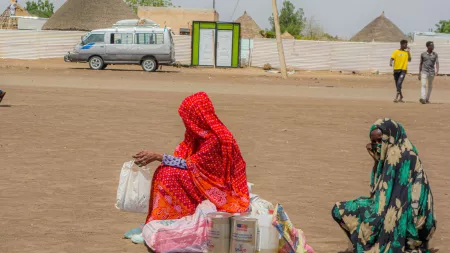CARE, Nairobi, Kenya, – 11, July 2024 – Sudan is facing the largest food crisis in the world. Over half of Sudan's population, is facing disastrous levels of hunger and extreme protection risks. This situation is forecasted to worsen as the country endures reduced agricultural output ahead of the next harvest in September 2024, with the destruction of crops and agricultural assets, while fighting continues to escalate. Since the beginning of July, an uptick in violence in Sinnar and Sinjah in the Eastern part of Sudan has led to an influx of displaced people into towns in neighboring regions such as Gadarif, New Halfa, and Kassala. Many of those arriving have already been displaced multiple times since the beginning of the conflict in April 2023.
“They arrive utterly exhausted, starving, penniless, and deeply traumatized. The stories we hear from them are nothing short of tragic."Ebstem Ahmed, CARE Sudan, Head of Office
"In Kassala, we are witnessing droves of displaced people, mostly women and children, arriving daily from Sinnar and Sinjhah where there has been intense fighting,” said Ebstem Ahmed, CARE Sudan, Head of Office in Kassala. “They arrive utterly exhausted, starving, penniless, and deeply traumatized. The stories we hear from them are nothing short of tragic. They speak of harrowing journeys across areas filled with combatants who threaten them. They left with barely any food or water as they had to flee with nothing but the clothes on their backs. When they arrived here, they find there’s hardly anything to eat and must depend on handouts from community members struggling to cope with limited food.”
Across the country, the situation is particularly dire for 755,000 people in 10 states facing the most severe level of food insecurity. This includes parts of Kordofan, Blue Nile, Al Jazirah, and Khartoum the entire Darfur region. The escalation in conflict in Sinnar and Sinjah means that much-needed supplies cannot reach the White Nile, Kordofan, and further on to Darfur thus compounding the needs of affected communities. The ongoing fighting has disrupted agricultural production, driven up the price of food and fuel, and displaced families as civilians are deliberately targeted in this conflict.
"My children are starving and every day I see them losing weight as they become sicker. We are afraid we might lose our children."Halima*, a displaced mother of five at an Internally Displaced Persons (IDP) camp in East Darfur.
In Darfur, life for those who fled from the conflict in El-Fasher is a daily struggle with people resorting to eating leaves just to get by. Halima*, a displaced mother of five, paints a grim picture of the daily struggle for survival at an Internally Displaced Persons (IDP) camp in East Darfur. "My children are starving and every day I see them losing weight as they become sicker," she said," There is food in the markets, but it's too expensive. We are afraid we might lose our children. We urgently need food, clean water, good shelter, and medical care. "
"In the camps and other sites, parents are skipping meals to feed their children, who are already weak from malnutrition."Abdirahman Ali, CARE Sudan Country Director
“Families in Sudan are caught in a spiraling horror, and are living a nightmare that continues to worsen,” said Abdirahman Ali, CARE Sudan Country Director. "In the camps and other sites, parents are skipping meals to feed their children, who are already weak from malnutrition. Health facilities are overwhelmed, with many not functioning due to attacks and lack of supplies and resources. We risk losing children to malnutrition due to a lack of necessary nutritional supplements and/or advanced health services."
CARE continues to warn that the food security crisis is contributing to “a war on women”. In Sudan's conflict, women’s and girls’ lives have turned into a living nightmare. The UN is also warning that reports of appalling sexual violence have soared, wielded as a weapon to terrorize communities and exert control. Fighting has also worsened existing gender inequalities, leaving women and girls hardest hit by violence, displacement, hunger, and lost livelihoods.
CARE and partners' response
CARE Sudan and its partners are intensifying efforts to support the newly displaced. In Kassala, over the last several weeks, over 6,000 Internally Displaced People have received emergency food rations, including sorghum, cooking oil, salt, and lentils. In East Darfur, CARE has reached 1303 children with food rations.
Despite interventions like these, a lot more still needs to be done to end the suffering. Life-saving food assistance to millions on the brink of starvation is key to preventing what could become the largest famine in decades. Funding the grossly under-resourced humanitarian response plan is essential to meet escalating needs. This must include supporting the near-to-collapsing healthcare system, which is essential to respond to the scale of malnutrition Sudan is facing. We urge all parties to abide by their promises set out in the Jeddah Declaration of Commitment to Protect the Civilians of Sudan, to immediately cease hostilities, and allow unimpeded humanitarian access without delay. This must include the protection of objects necessary for food production, and facilitating the functioning of food systems and markets, in line with mitigating the risk of conflict-induced famine and widespread food insecurity in armed conflict. For people in Sudan, every day is an uphill struggle to survive. We can't stand by and watch Sudan succumb.
*Name changed to protect identity.
For media inquiries, please contact:
David Mutua, CARE East Central, & Southern Africa Regional Communication Advisor via: [email protected]
